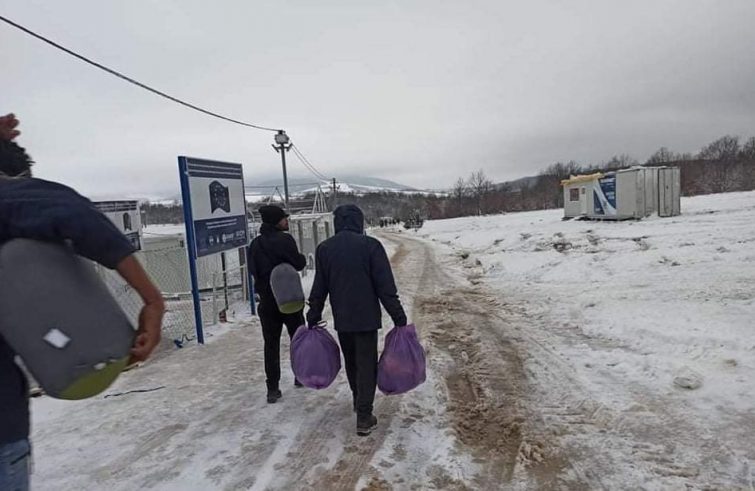
Migrants’ odyssey along the Balkan route, from Turkey to the Greek island of Lesbos living hell, and from there to Bosnia-Herzegovina (or Croatia), stops at the border, where Europe is a close albeit harsh mirage. Approximately one thousand young men, from Syria, Iraq, Iran, Afghanistan, Pakistan, Bangladesh, from the Maghreb countries and sub-Saharan Africa, are stranded in inhuman conditions, on the streets or in makeshift shelters, out in the cold and without help, treated “worse than animals, on the border with Europe, facing temperatures that drop to -10 degrees Celsius”. Daniele Bombardi, coordinator of Caritas Italy in the Balkans, reported to SIR from Sarajevo.
 “A humanitarian catastrophe.” Caritas Italy sounded a warning bell a few days ago over the ” humanitarian catastrophe ” unfolding in those areas, calling for the intervention of the European Union and national authorities. A total of around 8,000 refugees and migrants are present in Bosnia, according to estimates by the International Organization for Migration (IOM), 5,000 of them in migrant camps (the most vulnerable, such as families and lone minors) with 3,000 in makeshift shelters. Of these, almost 50% are families with children.
“A humanitarian catastrophe.” Caritas Italy sounded a warning bell a few days ago over the ” humanitarian catastrophe ” unfolding in those areas, calling for the intervention of the European Union and national authorities. A total of around 8,000 refugees and migrants are present in Bosnia, according to estimates by the International Organization for Migration (IOM), 5,000 of them in migrant camps (the most vulnerable, such as families and lone minors) with 3,000 in makeshift shelters. Of these, almost 50% are families with children.
The Lipa camp. Those stranded near Bihac are facing the most dramatic situation. The government is rebuilding the Lipa camp that was destroyed in a fire, in an isolated, inaccessible and unsafe site in the mountains, out of sight of the local population that staged angry protests against the migrants. Bosnian armed forces are currently setting up emergency tents in Lipa, but.
“they risk freezing to death. There is no drinking water, no heating, no electricity.
Minimum standards of respect for human dignity and rights are non-existent. It’s an insane decision that we strongly condemn.”
The alternative: the Bira camp. NGOs refuse to work in Lipa out of protest and are demanding that an alternative be found, such as reopening the Bira camp, a disused factory on the outskirts of Bihac, some thirty km away. Caritas is reflecting on whether to intervene, and in the meantime has sent relief supplies to Lipa through the Red Cross: food, water and firewood. Yet the proposal of reopening the camp in Bira, 20/30 km from Lipa, is strongly opposed by mayors and citizens, who have taken to the streets. Firefighters have also deployed their vehicles to prevent the reopening of the camp. “It would be the best solution to at least help people get through winter – said the Caritas worker – but things have turned sour. It’s a dialogue of the deaf.” If there is no mediation, the situation risks reaching a deadlock. “We have no information as to what is happening in the woodlands at the border, if there are people dying.
But tragedy is just around the corner.”
The paradox. “The paradox is that the EU and the IOM have allocated funds to build camps, which are unlikely to be used – Bombardi said – In order to not to lose popular consensus, the government is resorting to the strategy of removing migrants from public view and will probably pay out of its own pocket.” Following the accusations of humanitarian organizations, a lobbying effort was launched through embassies and the local Church “but it seems that the government is unwilling to respond to EU pressure.”
 The game. Croatian and Bosnian borders are sadly known for “the game”, i.e. young migrants’ and refugees attempt to cross the border on foot to reach Europe, in spite of increasingly strict controls with drones and police patrols. Most of the time they are harshly turned back. “They return after having been beaten up – Bombardi said – without money, documents, cell phones. There is a lot of violence. But they are not given the chance to move forward nor a dignified accommodation in a camp.”
The game. Croatian and Bosnian borders are sadly known for “the game”, i.e. young migrants’ and refugees attempt to cross the border on foot to reach Europe, in spite of increasingly strict controls with drones and police patrols. Most of the time they are harshly turned back. “They return after having been beaten up – Bombardi said – without money, documents, cell phones. There is a lot of violence. But they are not given the chance to move forward nor a dignified accommodation in a camp.”
Families with children. Families with children fare slightly better, housed in appropriate structures with meals, toilets and heating, and the support of social workers. But given the virtual impossibility of legal relocation, even these families will attempt to cross the border next spring, turning to traffickers to reunite with friends and relatives in Austria, Germany or Italy. This happens in a context of Covid-19 pandemic downplayed by the few coronavirus tests carried out so far and only to symptomatic people, not to close contacts, with few precautions, except for the mandatory masks and the curfew imposed from 11am to 5pm. On New Year’s Eve 8 young people died of carbon monoxide poisoning. Thousands of people attended the funeral. Humanitarian aid providers are using all precautions but the risk remains high.











